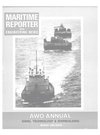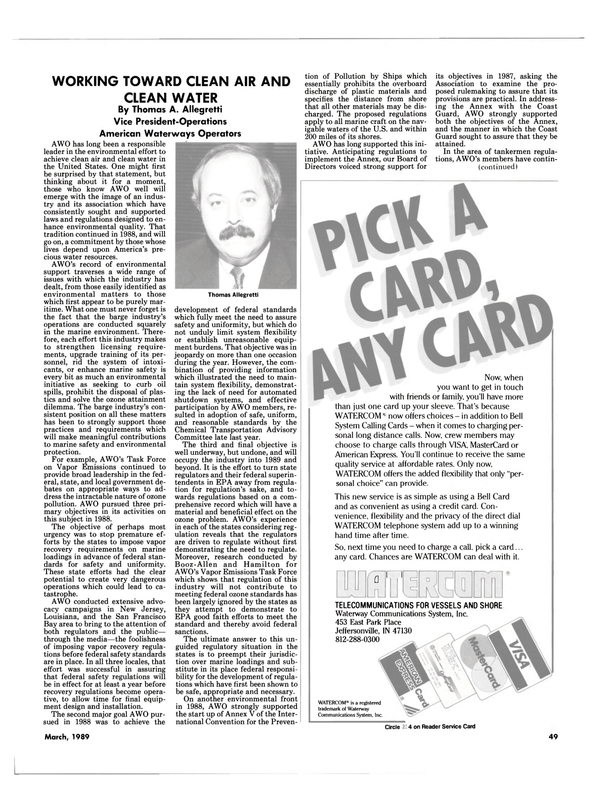
W O R K I N G TOWARD CLEAN AIR A ND CLEAN WATER
AWO has long been a responsible leader in the environmental effort to achieve clean air and clean water in the United States. One might first be surprised by that statement, but thinking about it for a moment, those who know AWO well will emerge with the image of an industry and its association which have consistently sought and supported laws and regulations designed to enhance environmental quality. That tradition continued in 1988, and will go on, a commitment by those whose lives depend upon America's precious water resources.
AWO's record of environmental support traverses a wide range of issues with which the industry has dealt, from those easily identified as environmental matters to those which first appear to be purely maritime.
What one must never forget is the fact that the barge industry's operations are conducted squarely in the marine environment. Therefore, each effort this industry makes to strengthen licensing requirements, upgrade training of its personnel, rid the system of intoxicants, or enhance marine safety is every bit as much an environmental initiative as seeking to curb oil spills, prohibit the disposal of plastics and solve the ozone attainment dilemma. The barge industry's consistent position on all these matters has been to strongly support those practices and requirements which will make meaningful contributions to marine safety and environmental protection.
For example, AWO's Task Force on Vapor Emissions continued to provide broad leadership in the federal, state, and local government debates on appropriate ways to address the intractable nature of ozone pollution. AWO pursued three primary objectives in its activities on this subject in 1988.
The objective of perhaps most urgency was to stop premature efforts by the states to impose vapor recovery requirements on marine loadings in advance of federal standards for safety and uniformity.
These state efforts had the clear potential to create very dangerous operations which could lead to catastrophe.
AWO conducted extensive advocacy campaigns in New Jersey, Louisiana, and the San Francisco Bay area to bring to the attention of both regulators and the public— through the media—the foolishness of imposing vapor recovery regulations before federal safety standards are in place. In all three locales, that effort was successful in assuring that federal safety regulations will be in effect for at least a year before recovery regulations become operative, to allow time for final equipment design and installation.
The second major goal AWO pursued in 1988 was to achieve the development of federal standards which fully meet the need to assure safety and uniformity, but which do not unduly limit system flexibility or establish unreasonable equipment burdens. That objective was in jeopardy on more than one occasion during the year. However, the combination of providing information which illustrated the need to maintain system flexibility, demonstrating the lack of need for automated shutdown systems, and effective participation by AWO members, resulted in adoption of safe, uniform, and reasonable standards by the Chemical Transportation Advisory Committee late last year.
The third and final objective is well underway, but undone, and will occupy the industry into 1989 and beyond. It is the effort to turn state regulators and their federal superintendents in EPA away from regulation for regulation's sake, and towards regulations based on a comprehensive record which will have a material and beneficial effect on the ozone problem. AWO's experience in each of the states considering regulation reveals that the regulators are driven to regulate without first demonstrating the need to regulate.
Moreover, research conducted by Booz-Allen and Hamilton for AWO's Vapor Emissions Task Force which shows that regulation of this industry will not contribute to meeting federal ozone standards has been largely ignored by the states as they attempt to demonstrate to EPA good faith efforts to meet the standard and thereby avoid federal sanctions.
The ultimate answer to this unguided regulatory situation in the states is to preempt their jurisdiction over marine loadings and substitute in its place federal responsibility for the development of regulations which have first been shown to be safe, appropriate and necessary.
On another environmental front in 1988, AWO strongly supported the start up of Annex V of the International Convention for the Prevention Prevention of Pollution by Ships which essentially prohibits the overboard discharge of plastic materials and specifies the distance from shore that all other materials may be discharged.
The proposed regulations apply to all marine craft on the navigable waters of the U.S. and within 200 miles of its shores.
AWO has long supported this initiative.
Anticipating regulations to implement the Annex, our Board of Directors voiced strong support for its objectives in 1987, asking the Association to examine the proposed rulemaking to assure that its provisions are practical. In addressing the Annex with the Coast Guard, AWO strongly supported both the objectives of the Annex, and the manner in which the Coast Guard sought to assure that they be attained.
In the area of tankermen regulations, AWO's members have contin- ued to urge the Coast Guard to move forward with the new federal regulations governing the training and certification of tankermen.
Most feel that many of the cargo spills which take place during transfer operations are the result of human error. Better training and more rigorous certification standards therefore seem to be a proper way to address this problem, and the barge industry has been at the vanguard of calling for a regulatory project that does so. As a result, the Coast Guard has agreed to move this project forward as a priority matter and a regulatory proposal is expected early in 1989.
In the Congressional area, AWO has long supported legislation to establish an oil spill cleanup and compensation fund to replace the four existing specialized funds. The predicate for that support is the preemption of state requirements, the provision of reasonable limits of liability, and the compensation of legitimate victims of oil spills. That position continued in earnest in 1988.
While there is strong support in the Congress, in environmental quarters and industry for enactment of comprehensive oil spill legislation, the components of the proposal remain contentious and diverse.
As we did in 1988, AWO will continue to promote balanced legislation which enhances the protection of the marine environment without robbing consumers of the benefits of low cost barge transportation.
Related to environmental concerns, certainly, is the transport and handling of hazardous material. As part of the nation's concern for the environment, transportation systems used to move hazardous materials are receiving increased attention.
Congress, in 1989, will consider legislation intended to impose additional regulation on hazardous material transportation. It is essential that AWO inform federal and local lawmakers of the emphasis the tug and barge industry places on safety, and the highly specialized and regulated equipment used to transport these cargoes.
An industry and a trade association with an enviable record of environmental protection? Absolutely.
Examine the industry's position on any matter of direct or indirect environmental consequence any time in recent memory. The environmental conscience of this industry— its support for the preservation of the waters on which it operates— is unmistakable.
Does that mean that our position aligns consistently with that of purely environmental organizations that claim to carry the mantle of clean air and clean water? No, not any more than the position of the pure environmentalists always coincides with the industry's point of view. Debate and balance; those are the keys to sane environmental policy.
The longstanding position of care for the environment in which we work remained a hallmark of AWO in 1988. It will continue to guide us this year and beyond.
Read W O R K I N G TOWARD CLEAN AIR A ND CLEAN WATER in Pdf, Flash or Html5 edition of March 1989 Maritime Reporter
Other stories from March 1989 issue
Content
- HBC Barge Acquired By Trinity Industries page: 5
- Marine Interiors Offers Free Literature Listing Products And Services page: 6
- M a r i t i m e London 8 9 To Be Held April 17-21 In City Of London page: 6
- Swagelok Quick-Connects With Heavy-Duty Body Sleeve Now Available page: 8
- Palmer Offers Brochure On Cavitation-Reducing Polymer Coatings page: 8
- T w i n Disc Expands M a r i n e Transmission Series For Workboat Applications page: 9
- Soundcoat Offers Brochure On Vibration-Dissipating Noise Reduction Material page: 9
- N a u t i C a n Enterprises Reports Advanced Propeller Nozzle Improves Thrust, Lowers Drag page: 10
- Gladding-Hearn Announces Sale Of 3rd High-Speed Ferry For Great Lakes page: 10
- Avondale Boat Division Building 400-Passenger SES Ferry page: 11
- Lykes Names Two Senior VPs And Three New VPs page: 11
- Navigation & Communications Equipment Review page: 12
- N A V Y — A $35-BILLION ANNUAL MARKET page: 25
- MAJOR NAVY CONTRACTS page: 27
- ASNE-Mechanicsburg Section To Host Annual N a v a l Logistics Symposium In Carlisle, Pa., O n March 7 -9 page: 30
- Newest Navy Crane Ship Christened 'Diamond State' At Tampa Shipyards page: 31
- Southwest M a r i n e Drydocks Two N a v y Vessels Simultaneously For Extensive Repair Work page: 34
- Portland Ship Repair Yard Posts Successful Year page: 34
- Eldec Corporation And Dunlop Limited Form Joint Venture Company page: 34
- Dampa Appoints Hopeman Brothers Sole U.S. Distributor page: 35
- Compass Display Protected From Abrasion By Coating page: 36
- ABS Forms Corporate Quality Assurance Group page: 36
- Imperial Immersion Suits Save Lives; Survivors Get Club Membership page: 36
- SSE Launches New Class Corvette For Singapore Navy page: 38
- L&C Associates Offers Brochure On Marine Dehumidification Service page: 38
- Rolla's New Five-Bladed REXP5 Propeller Represents Breakthrough In Design page: 38
- Cargocaire Introduces Marine Dehumidifier page: 39
- Marinette Marine Tests MCM-2 Propulsion Plant page: 40
- New Generator Line From Marathon Electric page: 40
- Pan American Hovercraft Offers Color Brochure On New Design Hovercraft page: 43
- VPSI Completes Crankshaft Contract page: 43
- A W O Acclaimed For Quick, Decisive Action To Combat Drought Effects page: 44
- CABOTAGE: I N THE INTEREST OF N A T I O N A L DEFENSE A ND COMMERCE page: 46
- SUCCESS O N TAX FRONT DOMINATED 100TH CONGRESS page: 47
- W O R K I N G TOWARD CLEAN AIR A ND CLEAN WATER page: 49
- Muller Appointed Assistant VP-Operations At Moran Towing page: 51
- A W O Annual M e e t i n g To Be Held In Washington, D.C. April 6 -7 page: 51
- Literature Available On Circle Seal's Plastic Inline Check/Relief Valves page: 51
- New Commuting Service Begins Between New Jersey And New York page: 51
- New Engine Analyzer Reduces Fuel Costs On Marine Diesels page: 52
- American United Marine Wins Achievement Award For TFC Compactor Sales page: 52
- First U.S. Commercial SWATH To ABS Class Under Construction page: 53
- Unitor Ship's Hospital, Safety And Maintenance Equipment Chosen For 'Royal Viking Sun' page: 53
- Aluminum Boats Delivers 150-Passenger Excursion Boat To Maryland Tours page: 63
- Alfa Products Introduces New Boat Bilge Cleaner —Literature Available page: 63


